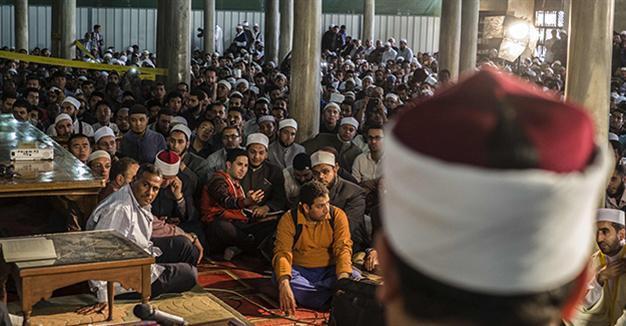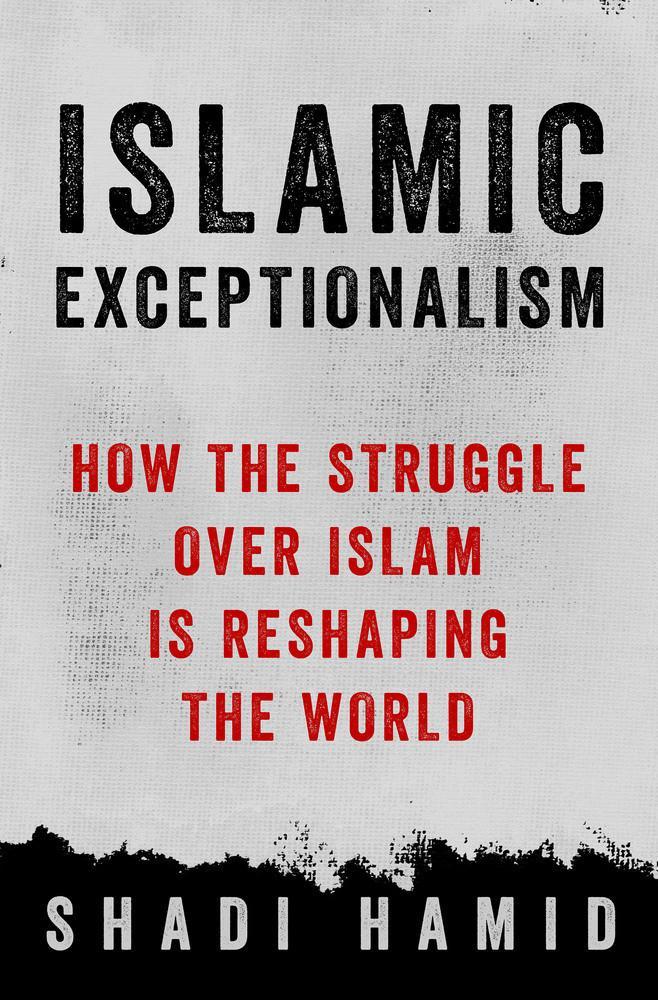Islamic exceptionalism
William Armstrong - william.armstrong@hdn.com.tr

Muslims attend a lecture at the al-Azhar mosque in Cairo on April 19, 2016. AFP photo
‘Islamic Exceptionalism: How the Struggle Over Islam Is Reshaping the World’ by Shadi Hamid (St. Martin’s Press, 320 pages, $26)There has been plenty of talk about how today’s bloodshed in the Middle East is based in crises of legitimacy and governance. Countries are said to rely on shaky arrangements that fail to win the loyalty of local populations without coercion or appeal to sectarian solidarity. Instability, violence and economic stagnation are inevitable if fundamental questions of state legitimacy are not addressed.
 A variation of that argument underpins “Islamic Exceptionalism: How the Struggle over Islam is Reshaping the World” by Shadi Hamid, a senior fellow at the Brookings Institution. Hamid says the current troubles are tied, at least in part, to the unresolved question of how Islam relates to the state. “Islam is, in fact, distinctive in how it relates to politics,” he writes. Instability is inevitable so long as that difference is not accommodated in governance and legal structures. “In conservative societies – and even in less conservative ones – a prominent role for religion may be unavoidable. If there is enough of a demand for Islamization, someone will have to supply it,” he writes. “If the people of the Middle East are to establish – after a long period of violent struggle – a more stable and legitimate order, Islam will have to have its place within the democratic process.”
A variation of that argument underpins “Islamic Exceptionalism: How the Struggle over Islam is Reshaping the World” by Shadi Hamid, a senior fellow at the Brookings Institution. Hamid says the current troubles are tied, at least in part, to the unresolved question of how Islam relates to the state. “Islam is, in fact, distinctive in how it relates to politics,” he writes. Instability is inevitable so long as that difference is not accommodated in governance and legal structures. “In conservative societies – and even in less conservative ones – a prominent role for religion may be unavoidable. If there is enough of a demand for Islamization, someone will have to supply it,” he writes. “If the people of the Middle East are to establish – after a long period of violent struggle – a more stable and legitimate order, Islam will have to have its place within the democratic process.”Hamid is very good on how Islamism is a product of modernity. The Muslim Brotherhood, founded in Egypt by Hassan al-Banna in 1928, was an attempt to adapt the modern nation state to Islam. It was at this point that Islam, for perhaps the first time in its history, became a distinct and self-consciously political project. Previously religion never had to become such a project, Hamid writes, because its “role in public life was inescapable … and, more important, unquestioned. It went without saying, so it wasn’t said.” But with secularism and modernity rewriting the rules of the game, “Islam was no longer the natural order of things … so it had to be reaffirmed and reasserted.” This is a story of how a religion becomes a religious ideology:
Because it was taken away, it would have to be regained. Because it was weak, it would have to be strengthened. It was doubted, so it would have to be affirmed. This was an Islam that was self-conscious, and this is what made it different from what had come before … But this is the irony of it all: in order to retrieve something that was lost – this supposedly pure, original Islam – it would become transformed into something new and unprecedented.
But a resolution to the question of the relation between religion and the state continues to prove elusive.
There is a risk that Hamid’s idea of “exceptionalism” plays into the hands of both fundamentalist Islamists and anti-Muslim bigots. Following the argument to its logical conclusion could lead to essentialism rather than exceptionalism. Suggesting that only political Islamists recognize the inherent “difference” of Islam implies that they are the only legitimate political force and the only authentic reflection of social demands. But of course there are many Muslims who have argued for a liberal version of Islam, or for whom religion is simply not important. They should not be dismissed as somehow inauthentic or illegitimate. If they are, the result is the kind of angry, polarizing populism that we see in today’s Turkey, where all who don’t tow the ruling Justice and Development Party (AKP) line are dismissed as external impositions at best, traitors at worst.
There’s also a problem with the dichotomy of the “secular state” vs. “religious society,” upon which much analysis rests – and upon which political Islam bases its legitimacy. In fact, states across the Middle East are far more ambiguous. Authoritarian non-Islamist regimes are happy to coopt religious sentiments by passing Islamic laws and incorporating Islamic institutions within the state. This could be seen under “secular” Baathists in Iraq in the 1990s, as well as under the “secular” Sisi regime in Egypt today.
Turkey has long been held up as the quintessential secular state in the Middle East, but the reality is far murkier. Islam was intrinsic to Turkish national identity at the republic’s founding in 1923 and it was gradually incorporated into the state over subsequent decades. This process accelerated after the 1980 military coup, when a Turkish-Islamic synthesis became the official state ideology, supporting conservative religious values in the name of national stability. Parts of the military remained rigidly secular, and headscarf bans were imposed in universities and other public buildings. But state religious schools proliferated and the budget of the Department of Religious Affairs (Diyanet) skyrocketed. Clearly the idea of Islamism as the natural, legitimate challenger of a homogenous “militantly secular state” is too simplistic, flattening decades of fluctuation and renegotiation. This may not refute Hamid’s thesis, but it at least complicates it.
The book’s sections on Turkey are very perceptive. Here, an Islamist-originated party has been in power since 2002, but it is still on the warpath against alleged dark forces working to foil its plans. Like stroppy teenagers, Turkey’s current rulers are apparently unable to accept responsibility for anything, which supports Hamid’s idea of Islamism “only making sense in opposition to something [secularism].” “Even as the most powerful man in Turkey since Atatürk,” he writes, President Erdoğan “[plays] the role of outsider fighting a host of enemies, both real and imagined. A ruling party that sounds like an opposition party even when it’s in power is an odd – and potentially dangerous – thing.”
Hamid’s understanding of the anti-democratic shift under the Erdoğan is more subtle than most. Reflecting on conversations with AKP officials, he describes how demands for justice have slipped into thirst for revenge:
I had spent years getting to know Islamist activists and leaders in Egypt, Jordan, Tunisia, and elsewhere in the region … The one thing they all shared was a desire to at least sound conciliatory, even if they weren’t particularly serious about it. They would emphasize their desire to coexist and cooperate with secularists. One can debate the sincerity of the rhetoric, but the pretense was there. What was striking about many of my conversations with AKP officials and supporters was that the pretense seemed to be lacking. Gone was the talk of compromise.
As much as anything else, this was prompted by changing incentives. “Erdoğan’s shift to the right was less a premeditated plan by a brilliant, conniving politician and more a case of shifting incentives,” Hamid suggests. “The threat of military intervention (the stick) and the promise of EU access (the carrot) were eventually removed. If those incentives had a moderating effect, then presumably their removal would allow the AKP to proceed along a more ‘natural’ path.” Hamid quotes AKP founding member Yaşar Yakış as saying that “as circumstances and opportunities allowed, the AKP pursued its interests.’ When those circumstances and opportunities changed, so too did the AKP.”
Overall, this is a clearly written and intelligently argued book. Even if you disagree with the entire premise there is plenty to learn from it. Islamists may be all-conquering in Turkey but they are embattled almost everywhere else in the region; but Hamid is surely right to observe that they have deep roots and are likely to weather the current storm. The sound and fury looks set to go on.
*Follow the Turkey Book Talk podcast via iTunes here, Stitcher here, Podbean here, or Facebook here.










